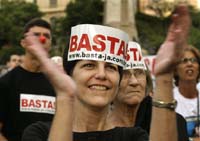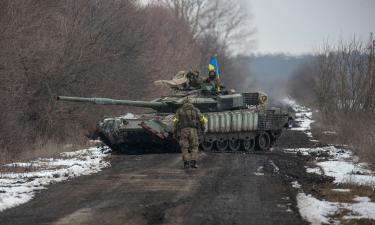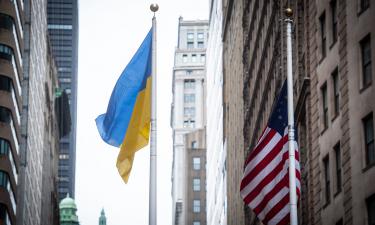Brazilians protest gang violence
Brazilians angered by gang violence that rocked South America's largest city demonstrated across the country, with many blaming the bloodshed that left 172 people dead on rampant corruption. Lawmakers were also focusing on corruption as they investigated a leak from a closed-door congressional session that may have tipped the First Capital Command gang in advance about police plans to break the gang's influence by transferring of hundreds of their members to far-flung prisons. A hearing was scheduled for Tuesday.

Two days after the leak, gang leaders behind bars sent orders to their "soldiers" to attack on the outside. Forty-one police officers and prison guards were killed, dozens of city buses were torched simultaneous prison rebellions broke out across Sao Paulo state, Brazil's most populous. Demonstrators declared Sunday a "Day of National Dignity" in Sao Paulo, Rio de Janeiro and other major cities, where protesters decried the failure of politicians to crack down on organized crime.
"We're really protesting corruption," said Gabriela Campos Paulino, who was organizing the Sao Paulo march. She said demonstrators were honoring slain police officers during the march. "Corruption generates this type of lack of governance and lack of security," she said. Between 1,500 and 2,000 protesters showed up for the march in Sao Paulo, according to police estimates. In Rio de Janeiro about 200 to 300 protesters gathered, holding a minute of silence for those killed in the violence.
Two days before the First Capital Command launched the May 12 attacks that triggered the violence, top Sao Paulo police officials told lawmakers in a secret session in the capital of Brasilia that they planned to transfer gang members to other prisons in a bid to break the gang's power. But an audiotape of the session was sold for less than US$100 ( Ђ 78) to lawyers who represent gang leaders, leading to speculation that the gang knew in advance about the transfers. A Brazilian congressional committee on Tuesday will question the lawyers about the tape.
President Luiz Inacio Lula da Silva, meanwhile, on Sunday made his first visit to Sao Paulo since the city was hit by a wave of gang attacks on police and said that the violence could not be stopped by simply beefing up the police presence. Silva said Brazilians have to address the roots of the violence.
"This problem of violence is cultural and needs a lot more than police," the leftist president said at the inauguration of a new union hall. "Why are the bandits free to do what they want and we don't have control? Why do lawyers not want to be searched when they visit prisoners? We need to meditate more deeply over a solution." Silva said that Sao Paulo state Gov. Claudio Lembo, a member of the opposition Liberal Front Party, "couldn't have done any more than he did."
Lembo was quoted in Sunday's Estado de S. Paulo newspaper acknowledging for the first time that police may have committed abuses as they reacted to killings of their comrades. The gang shot police on the streets, at their stations, in their homes and at afterwork hangouts in reprisal for the attempt to transfer jailed gang leaders. Over the following days, police struck back, killing 109 suspected criminals, many in unclear circumstances. Eighteen prison inmates and four bystanders also were killed.
Human rights groups said they feared police may have killed innocent bystanders in their subsequent crackdown. "I hope there weren't innocent people killed," Lembo told the newspaper. "But it is such a difficult moment for the police with confrontations that occurred and it is eventually possible that some innocents were killed", reports the AP.
N.U.
Subscribe to Pravda.Ru Telegram channel, Facebook, RSS!





